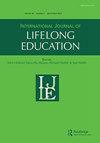The European year of skills 2023: skills for now and in the future?
IF 1.9
Q2 EDUCATION & EDUCATIONAL RESEARCH
引用次数: 0
Abstract
Lifelong education and learning has remained one of the highest prioritised topics for countries, political bodies, and enterprises for several decades while also representing a dynamic and vibrant research field and community. Within the context of lifelong education and learning policy, practice, and research, the notion of ‘skills’ has emerged as a crucial approach and theme that has gathered significant attention in Europe and beyond. The emphasis on skills has been particularly pronounced within the European Union (EU) since the Lisbon Strategy (Commission of the European Communities, 2000). The EU’s focus on skills development has been reinforced by the Europe 2020 aim and a general, more robust push on skills was observed in the European Social Pillars encompassing skills indicators and benchmarks (European Commission, 2018). Building on the aforementioned statements, it is noteworthy that on 7 March 2023, a political agreement was reached by the European Parliament and Member States on the European Year of Skills 2023 (European Commission, 2023). The political agreement was signalled by President Ursula von der Leyen in the 2022 State of the Union address highlighting the need for the EU to promote and invest in continuous upskilling and reskilling of all working-age adults (European Commission, 2022a). We welcome the renewed policy promotion and investment in lifelong education and learning, with its focus on skills and skills development, as evidenced by this European Year of Skills 2023. The hope is that this renewed interest will extend beyond the European Year of Skills in 2023 and constructively address global challenges such as skills gaps, staff shortages, and talent migration. We, however, also advocate for lifelong education and learning to be integrated. Further, to be permanent components of any proactive policy aimed at development, value creation, and adaptation to changes on all levels, rather than being done reactively over a short period in response to changes resulting in narrow solutions. Consequently, it is essential to ensure that skills and skills development opportunities are approached in an expansive way and that ‘skills’ are more than a matter of immediate job and enterprise productivity improvement alone. In this way, skills in the context of lifelong education and learning research should be seen as a question of the whole person and their career over the long term, as well as addressing societal inequality and disadvantage. This editorial examines the four primary policy levers outlined in the political agreement on the European Year of Skills 2023, drawing on existing research in the field of lifelong education and learning. The proposal for a European Year of Skills 2023, like the political agreement and the site dedicated to disseminating objectives, background, and skills development opportunities in an EU context, underlines the known explanations and logics for why lifelong education and learning is once again on the top of the EU agenda (European Commission, 2022b). For instance, the green and digital transitions as well as demographic changes resulting in labour mismatches, skills gaps, and shortage of staff highlight the need for solutions to meet the demands of the labour market (ibid.). The strategic areas for the European Year of Skills 2023 are particularly focused on2023年欧洲技能年:现在和未来的技能?
几十年来,终身教育和学习一直是国家、政治机构和企业最优先考虑的主题之一,同时也代表着一个充满活力的研究领域和社区。在终身教育和学习政策、实践和研究的背景下,“技能”的概念已成为一种重要的方法和主题,在欧洲及其他地区引起了极大的关注。自《里斯本战略》(欧洲共同体委员会,2000年)以来,欧洲联盟(欧盟)特别强调技能。2020年欧洲目标加强了欧盟对技能发展的关注,在包括技能指标和基准的《欧洲社会支柱》中观察到对技能的全面、更有力的推动(欧盟委员会,2018)。在上述声明的基础上,值得注意的是,2023年3月7日,欧洲议会和成员国就2023年欧洲技能年达成了一项政治协议(欧盟委员会,2023)。总统乌尔苏拉·冯德莱恩在2022年国情咨文中表示,欧盟需要促进和投资于不断提高所有工作年龄成年人的技能和再技能(欧盟委员会,2022a)。我们欢迎对终身教育和学习的新政策推广和投资,其重点是技能和技能发展,2023年欧洲技能年就是明证。希望这种新的兴趣将延续到2023年的欧洲技能年之后,并建设性地应对技能差距、员工短缺和人才迁移等全球挑战。然而,我们也主张将终身教育和学习结合起来。此外,要成为任何旨在发展、创造价值和适应各级变化的积极政策的永久组成部分,而不是在短时间内被动应对导致狭隘解决方案的变化。因此,必须确保以广泛的方式获得技能和技能发展机会,并且“技能”不仅仅是工作和企业生产力提高的直接问题。这样,终身教育和学习研究背景下的技能应该被视为整个人及其职业生涯的长期问题,并解决社会不平等和劣势问题。这篇社论借鉴了终身教育和学习领域的现有研究,探讨了2023年欧洲技能年政治协议中概述的四个主要政策杠杆。2023年欧洲技能年的提案,就像政治协议和致力于在欧盟背景下传播目标、背景和技能发展机会的网站一样,强调了为什么终身教育和学习再次成为欧盟议程首要议题的已知解释和逻辑(欧盟委员会,2022b)。例如,绿色和数字转型以及导致劳动力错配、技能差距和员工短缺的人口结构变化,突出了满足劳动力市场需求的解决方案的必要性(同上)。2023年欧洲技能年的战略领域特别关注
本文章由计算机程序翻译,如有差异,请以英文原文为准。
求助全文
约1分钟内获得全文
求助全文
来源期刊

International Journal of Lifelong Education
EDUCATION & EDUCATIONAL RESEARCH-
CiteScore
3.10
自引率
27.80%
发文量
40
期刊介绍:
The International Journal of Lifelong Education provides a forum for debate on the principles and practice of lifelong, adult, continuing, recurrent and initial education and learning, whether in formal, institutional or informal settings. Common themes include social purpose in lifelong education, and sociological, policy and political studies of lifelong education. The journal recognises that research into lifelong learning needs to focus on the relationships between schooling, later learning, active citizenship and personal fulfilment, as well as the relationship between schooling, employability and economic development.
 求助内容:
求助内容: 应助结果提醒方式:
应助结果提醒方式:


